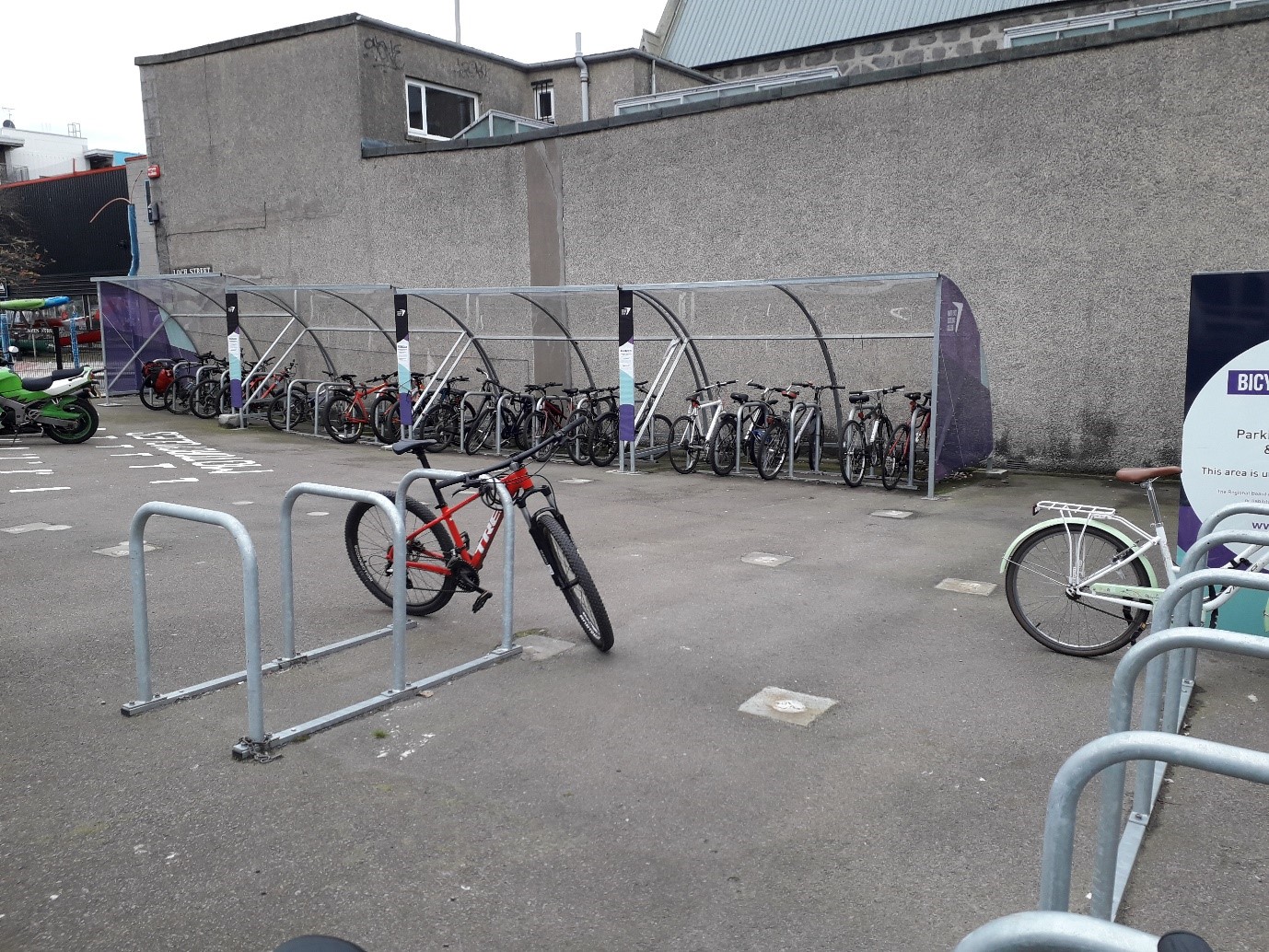North East College Scotland
Overcoming barriers to cycling in the north of Scotland.
With a number of modern campuses and learning centres spread throughout Aberdeen City and Aberdeenshire, North East Scotland College is widely accessible for people across the region. The main campuses are City Campus, Altens Campus, Fraserburgh Campus and the Scottish Maritime Academy. The college also has Learning Centres in Ellon and Inverurie. Its 21,000 students can access learning across engineering, creative industries, computing and service industries.
Environmental commitments
The college aims to minimise its carbon footprint and the production of other harmful emissions and is at the forefront of colleges in Scotland in its environmental initiatives, by changing its vehicle fleet to electric, hydrogen and hybrid cars and hosting the local district heat and power plant room. The college’s Environmental Social Strategy states that it aims to specifically encourage the use of public transport, walking and cycling as one way of minimising these emissions, as well as fitting in with the college’s aim to improve the health and wellbeing of its students and staff.
Barriers to cycling
Previously, students were put off cycling to college, saying that the distance to travel, a lack of sufficient, covered, secure cycle parking, the perception that the roads are unsafe and a lack of access to bikes were all barriers to people getting on their bikes.
How the Cycling Friendly Campus fund has helped
In 2017, the college applied to the Cycling Friendly Campus fund and was awarded £16,140 to renovate the cycle parking area and install a mix of 69 sheltered, unsheltered and secure bike parking spaces.
The fund has addressed the lack of proper, fit-for-purpose cycle parking. Whilst the previous area was unwelcoming, wasn’t looked after and didn’t provide enough cycle parking at the busiest times, the fund has provided a more covered cycle parking spaces which allows more people to cycle to college and leave their bike in a suitable location.
There are now also uncovered stands and lockers so all the cycle parking is located together, making it simple to find, and the new shelters display branding which tells users of the CCTV coverage of the area. This makes people feel more confident to cycle to college as they can see the bike parking area is secure and looked after.
Another barrier which the funding has partly addressed is the perception that the weather is unsuitable for cycling. The new shelters protect bikes from the weather, ensuring that saddles remain dry for when they will be used, and extending the life of bike parts. The parking area now provides 40 covered and 20 uncovered spaces available for all college members to use, plus nine bike lockers which are allocated to staff.

The development fund has allowed the college to overcome the barrier of not enough fit-for-purpose cycle parking, providing better facilities for people to leave their bikes unattended for part or all of the day. During college hours there are always bikes parked in the cycle area, no matter the weather or season.
Staff and students are benefitting
Staff and students have both benefitted from the fund as the new cycle parking has encouraged more people to cycle to college, improving physical and mental health and wellbeing.
A bigger and better cycle parking area at the main campus in Aberdeen means that more people are now happy to cycle and save money from bus fares, helping to alleviate some of the issues around travel costs and transport poverty and health inequalities.
A personal story
One student recently started to cycle as a way of fitting exercise into his day as his studies and part-time job take up the majority of his time. Cycling now allows him to get home easily after late shifts at work and to travel between college and work, knowing he’ll be on time rather than having to rely on and pay for public transport.
Work still to be done
There are some other barriers that are harder to overcome: distance continues to be a barrier, preventing a large proportion of students from cycling, many people believe they don’t have the appropriate gear to cycle to college, think the weather is too unpleasant for cycling, or that the roads are too dangerous to cycle.
Briony Kincaid, the college’s Campus Cycling Officer, said that the fund is “a great way to improve cycling facilities, which are often seen as a smaller project so they can be overlooked or under-budgeted within the organisation. The process was straightforward and Cycling Scotland provided advice and support at all stages of the process.”
